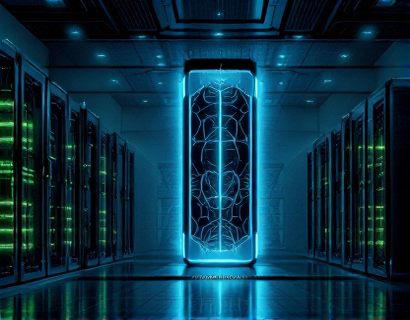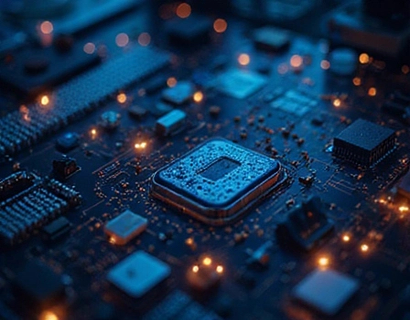Blockchain-Powered Registry Solutions: Elevating Data Management with Enhanced Security, Transparency, and Efficiency
In the rapidly evolving landscape of data management, the integration of blockchain technology has emerged as a transformative force, offering unparalleled security, transparency, and efficiency. This article delves into the realm of blockchain-powered registry solutions, exploring how these innovative platforms are revolutionizing the way professionals and enthusiasts approach data management, security, and digital transformation. Whether you are a registry management professional, a data security advocate, an IT and software development team member, a government regulatory body, or a business process optimization expert, this comprehensive guide aims to provide valuable insights and educational content on the benefits and applications of blockchain-enabled registry solutions.
Understanding Blockchain Technology in Registry Management
To fully appreciate the impact of blockchain-powered registry solutions, it is essential to first understand the fundamental principles of blockchain technology. At its core, a blockchain is a decentralized digital ledger that records transactions across multiple computers in such a way that the registered transactions cannot be altered retroactively. This inherent immutability ensures that once data is recorded, it remains tamper-proof, providing a high level of data integrity.
Blockchain technology operates on a network of nodes, each maintaining a copy of the entire ledger. Transactions are grouped into blocks, and each block is linked to the previous one through cryptographic hashes, forming a chain. This structure not only ensures the integrity of the data but also enhances transparency, as all participants in the network can verify the transaction history independently.
Enhanced Security through Blockchain
One of the most significant advantages of blockchain-powered registry solutions is the enhanced security they offer. Traditional registry systems are often centralized, making them vulnerable to cyber attacks, data breaches, and unauthorized access. In contrast, blockchain's decentralized nature distributes the data across a network of nodes, eliminating single points of failure and reducing the risk of security breaches.
Each transaction in a blockchain is encrypted and verified through consensus mechanisms, such as Proof of Work or Proof of Stake. These mechanisms require network participants to solve complex mathematical problems, ensuring that only valid transactions are added to the blockchain. This process, known as mining, not only secures the network but also adds a layer of trust, as the validity of each transaction is independently confirmed by multiple nodes.
Transparency and Traceability
Transparency is another cornerstone of blockchain technology, and it plays a crucial role in registry management. In a blockchain-based system, all transactions are recorded in a public ledger, which is accessible to all participants. This openness ensures that every change, update, or transaction is visible and verifiable, fostering a high level of trust among users.
Traceability is a direct result of transparency. With blockchain, each data entry can be traced back to its origin, providing a clear audit trail. This feature is particularly valuable in regulatory compliance, where organizations must demonstrate the authenticity and integrity of their data. The ability to track the history of data entries helps in identifying and rectifying any discrepancies or fraudulent activities, thereby enhancing the overall reliability of the registry.
Efficiency and Streamlined Processes
Blockchain-powered registry solutions not only enhance security and transparency but also significantly improve efficiency. Traditional registry management often involves manual processes, intermediaries, and paper-based systems, which are time-consuming and prone to errors. Blockchain automates and streamlines these processes, reducing the need for intermediaries and minimizing human intervention.
Smart contracts, self-executing contracts with the terms directly written into code, are a key feature of blockchain technology that can revolutionize registry management. These contracts automatically enforce and execute the terms of an agreement when predefined conditions are met, eliminating the need for manual verification and reducing the risk of errors or delays.
Moreover, blockchain's ability to handle large volumes of transactions simultaneously ensures that registry processes are not only faster but also more scalable. This scalability is particularly beneficial for organizations dealing with vast amounts of data, such as government agencies, financial institutions, and large corporations.
Use Cases in Various Industries
The applications of blockchain-powered registry solutions are diverse and far-reaching, impacting multiple industries and sectors. Here are some key use cases that highlight the transformative potential of this technology:
- Government and Public Sector: Blockchain can enhance the management of identity verification, land registries, voting systems, and supply chain transparency. For instance, a blockchain-based land registry can provide a secure and transparent record of property ownership, reducing fraud and disputes.
- Healthcare: Patient records can be securely stored and shared across different healthcare providers using blockchain, ensuring data integrity and privacy. This can lead to more coordinated care and improved patient outcomes.
- Finance and Banking: Blockchain can streamline processes such as Know Your Customer (KYC) checks, cross-border payments, and securities trading. Smart contracts can automate these processes, reducing costs and increasing efficiency.
- Supply Chain Management: Blockchain can provide end-to-end visibility of the supply chain, from raw materials to the final product. This transparency helps in ensuring product authenticity, tracking product origins, and compliance with regulations.
- Intellectual Property: Artists, inventors, and creators can use blockchain to securely register and manage their intellectual property rights, preventing unauthorized use and ensuring fair compensation.
Challenges and Considerations
While the benefits of blockchain-powered registry solutions are compelling, there are several challenges and considerations that organizations should be aware of:
First, the technology is still relatively new, and there is a learning curve associated with implementing and managing blockchain systems. Organizations need to invest in training and development to build the necessary expertise.
Second, scalability remains a challenge for some blockchain platforms, particularly those using proof-of-work consensus mechanisms. However, newer consensus algorithms and layer 2 solutions are addressing these issues, making blockchain more scalable and efficient.
Third, regulatory frameworks for blockchain technology are still evolving. Organizations must stay informed about local and international regulations to ensure compliance and avoid legal pitfalls.
Lastly, while blockchain enhances security, it is not a panacea. Organizations must still implement robust security practices and monitor their systems regularly to protect against emerging threats.
Future Trends and Innovations
The future of blockchain-powered registry solutions is promising, with ongoing innovations and advancements set to further enhance their capabilities:
1. Interoperability: Efforts to create interoperable blockchain networks will enable seamless data sharing and integration across different platforms, enhancing the utility and reach of registry solutions.
2. Privacy Enhancements: New privacy-focused blockchain technologies, such as zero-knowledge proofs, will allow for greater data privacy while maintaining transparency and security.
3. Decentralized Identity Management: Blockchain-based identity solutions will empower individuals to control their personal data and authenticate themselves securely across various platforms.
4. Integration with IoT: The combination of blockchain and the Internet of Things (IoT) will enable secure and transparent management of connected devices, opening new possibilities in areas like smart cities and industrial automation.
These trends indicate a future where blockchain-powered registry solutions become increasingly integrated into various aspects of data management, driving further innovation and efficiency.
Conclusion
Blockchain-powered registry solutions represent a significant leap forward in data management, offering enhanced security, transparency, and efficiency. By leveraging the unique properties of blockchain technology, organizations can streamline their processes, build trust, and stay ahead in a data-driven world. Whether you are a professional in registry management, a data security advocate, or a digital transformation leader, embracing blockchain-enabled solutions can provide a competitive edge and pave the way for a more secure and transparent future.










































